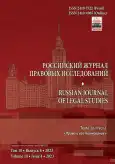Interpretation of Law as a Cognitive Process
- Authors: Aznagulova G.M.1
-
Affiliations:
- Institute of Legislation and Comparative Law under the Government of the Russian Federation
- Issue: Vol 10, No 4 (2023)
- Pages: 7-14
- Section: Trending topic
- URL: https://journal-vniispk.ru/2410-7522/article/view/250033
- DOI: https://doi.org/10.17816/RJLS595873
- ID: 250033
Cite item
Abstract
The interpretation of the law is an essential element of law enforcement by the state authorities and other competent authorities. It is primarily aimed at ensuring the rule of law and the rule of law in society.
Law enforcement is a multilevel complex system, whose peculiar characteristic is the presence of a spatial-temporal hierarchy. The theoretical and legal study of the theory and practice of law enforcement at specific stages of historical development is a crucial direction and an urgent task of legal science because of the special role of space and time in jurisprudence, namely, violation of the principle of their homogeneity in empirical and analytical sciences.
In the historical and hermeneutic sciences, the cognition of social, including legal, phenomena and texts is achieved by understanding and explaining the meaning using the methods and rules of hermeneutics. The critical analysis of theories and concepts is carried out by interpreting texts, which is paramount in the practical implementation of law.
More specifically, the interpretation of law is a complex cognitive process based on the conceptual and categorical apparatus of philosophy and law, covering broad legal reality. Its central task is to clarify the cause-and-effect, spatial-temporal, political-economic, and socio-conditioned connections related to the existence of a person in the state. Subsequently, the paramount is the establishment of the meaning, content, and purpose of the normative legal act
Full Text
##article.viewOnOriginalSite##About the authors
Guzel M. Aznagulova
Institute of Legislation and Comparative Law under the Government of the Russian Federation
Author for correspondence.
Email: agm09@mail.ru
ORCID iD: 0000-0001-7265-2399
doctor of law
Russian Federation, MoscowReferences
- Malahov VP, Aznagulova GM. Problema pravoponimaniya v usloviyah cifrovoj real’nosti // Vestnik MGPU. 2021;(2):37–44. (In Russ.). doi: 10.25688/2076-9113.2021.42.2.04
- Habrieva TYa. Izbrannye trudy: v 10 t. Vol. 6. Teoriya tolkovaniya prava. Teoriya pravotvorchestva. Koncepcii razvitiya zakonodatel’stva. Moscow: Rossijskaya akademiya Nauk; 2018. (In Russ.).
- Kerimov DA. Izbrannye proizvedeniya. V 3 t. Vol. 1. Moscow: Akademiya; 2007. (In Russ.).
- Aznagulova GM. Rossiya i novyj mirovoj poryadok. In: Global’nyj konflikt i kontury novogo mirovogo poryadka. XX Mezhdunarodnye Lihachevskie chteniya 9–10 iyunya 2022 goda. Saint-Petersburg: SPbGUP; 2022. P. 548–550. (In Russ.).
- Aznagulova GM. Substancional’naya sushchnost’ mezhdunarodnogo prava. Zhurnal rossijskogo prava. 2023;27(1): 138–151. (In Russ.).
- Bol’shoj yuridicheskij slovar’. Ed. by A.Ya. Suharev. Moscow: INFRA-M, 2006. (In Russ.).
- Ogurcov AP. Ponimanie. In: Novaya filosofskaya enciklopediya: v 4 t. Vol. 3. Ed. by V.S. Stepin. Moscow: Mysl’; 2000–2001. P. 279–283. (In Russ.).
- Habermas YU. Moral’noe soznanie i kommunikativnoe dejstvie. Saint Petersburg: Nauka; 2001. (In Russ.).
- Gejzenberg V. Chast’ i celoe. Moscow: Nauka; 1989. (In Russ.).
- Pashencev DA. Modernizaciya metodologii pravovyh issledovanij v usloviyah stanovleniya novoj nauchnoj racional’nosti. Zhurnal rossijskogo prava. 2020;8:5–13. (In Russ.). doi: 10.12737/jrl.2020.090
- Habermas YU. Tekhnika i nauka kak «ideologiya». Moscow: Praksis; 2007. (In Russ.).
- Frege G. Izbrannye raboty. Moscow: Dom intellektual’noj knigi; 1997. (In Russ.).
- Shpet Gustaf Yavlenie i smysl: fenomenologiya kak osnovanie nauki i ee problema. Moscow: Germes; 1914. (In Russ.).
- Zhigitov AA. Istinnyj smysl kak ob”ekt tolkovaniya prava. Teoriya gosudarstva i prava. 2023;(3):107–119. (In Russ.). doi: 10.25839/MATGIP_2023_3_107
- Habrieva TYa, Kovler AI, Kurbanov RA. Doktrinal’nye osnovy praktiki Verhovnogo suda Rossijskoj Federacii. Moscow: Norma, 2023. (In Russ.).
- Filosofskij enciklopedicheskij slovar’. Ed. by S.S. Averincev, E.A. Arab-Ogly, L.F. Il’ichev, et al. Moscow: Sovetsskaya enciklopediya; 1989. (In Russ.).
- Kerimov DA. Metodologiya prava (predmet, funkcii, problemy filosofii prava). Moscow: Avanta +; 2001. (In Russ.).
Supplementary files







